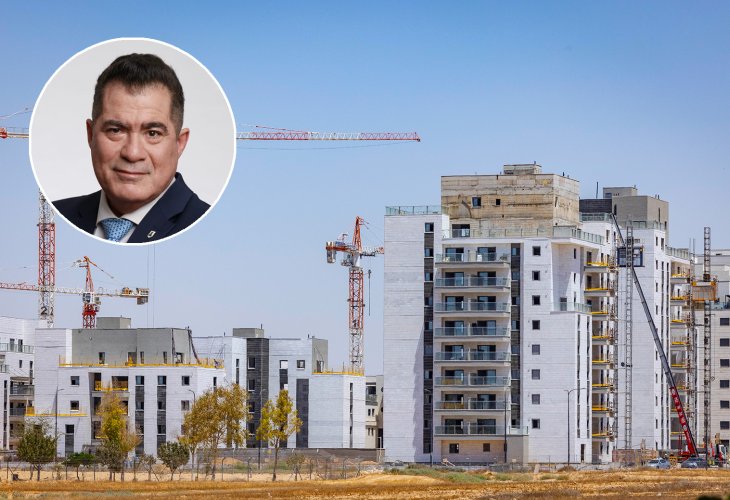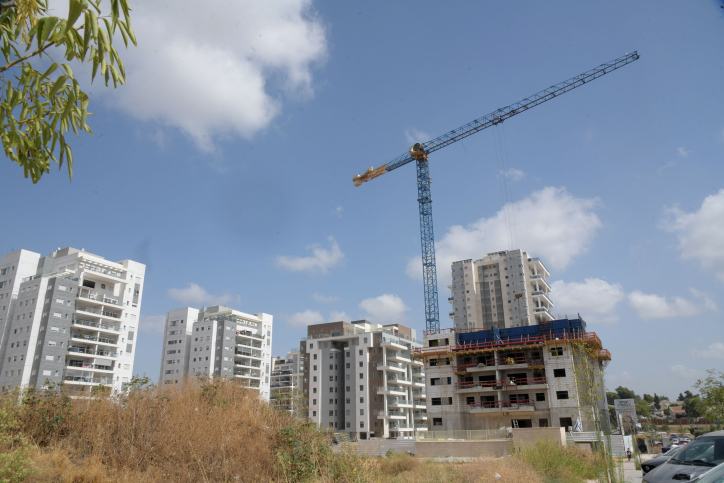"This is an Emergency Situation": The President of the Contractors Association Speaks to Hidab-root
The data showing the beginning of a decline in housing prices doesn't encourage Raul Sarugo, President of the Contractors Association. We set out to understand from one of the leading figures in the housing industry how high real estate prices can be reduced.
 Raul Sarugo (Photo: Ilan Bashor)
Raul Sarugo (Photo: Ilan Bashor)Raul Sarugo is well-versed in the world of construction. In fact, he has been in this field for three decades, and in recent years he has served as the President of the Contractors Association. Precisely from this position, it's crucial to hear the assessments of one of the strongest figures in the real estate sector, who — if you ask him — is entirely sure that the steps taken by the Bank of Israel are like a band-aid on a spreading wound, which will eventually harm us all.
Sarugo (60) has been voicing his opinion for a long time regarding the right measures, in his view, to combat the high cost of housing, and they differ greatly from the media's mainstream stance. Recently, following reports of a freeze and even a moderate decline in housing prices, he refused to align with the public mood and responded: "These are very bad results for the State of Israel. The data prove that the housing market is frozen solely due to the high interest rate. According to our assessment, by the end of 2022, we will see housing starts that hover around only 60,000 units, about 20% less than the government expected. The government must understand that the number of Israelis who wish to purchase apartments is only growing, but they are afraid to take mortgages at high interest rates. Meanwhile, contractors are also hesitant to build due to the high cost of loans for construction financing. This is an emergency situation, and the continued decline in housing starts could create the next spike in housing prices."
"Precisely as a contractor, I can say that housing prices here are among the highest in the world," Sarugo adds. According to him, the high prices are both in purchasing apartments and renting. But he believes there is another way to lower them.
The Problem: A Shortage of Nearly 200,000 Apartments
Let's start from the beginning, why did we reach this situation?
"In the past, they talked about housing prices as a bubble that would eventually burst, and it didn't happen," he replies. "Because these prices are not a bubble. Unlike a bubble, here it can perhaps be likened to a concrete ball, because there are real reasons for these high prices. The most prominent and significant is that demand outstrips supply."
"But we can fight it," Sarugo quickly adds. "After all, when there was the immigration from the Soviet Union, 100,000 apartments a year were built here to meet the need for housing for the immigrants. Ariel Sharon was then the Minister of Housing, and there was a national unity government. At that time, they built with full force, provided incentives, allocated land, and brought foreign workers. We need to do the same now. And if the government allows us — we can supply the needed number of apartments.
"It's important to understand," notes the President of the Contractors Association, "that we already have a shortage of nearly 200,000 apartments. Additionally, there is a need for an annual construction of a certain amount of apartments. In this regard, there's a debate whether we'll need 100,000 apartments a year, or 150,000 and even more. But if we look at the significant indicator — the number of applications for the 'Price for Buyer' lotteries — it shows that over 120,000 couples have registered. This indicates that there are about 120,000 people currently lacking an apartment. To this, we need to add about 20,000 weddings each year, thousands of immigrants, and unfortunately, divorces that also occur every year, leading to a need for 60,000-80,000 new apartments annually. Besides, of course, we must address the existing accumulated shortage, so in the coming years, we need to build about 100,000 new apartments each year."
 (Photo: Flash 90)
(Photo: Flash 90)Despite past precedent, Sarugo doubts whether it can happen again. "I doubt whether the outgoing government wanted to reduce housing prices, and even more so, I doubt if the treasury will allow a decrease in housing prices in the current scenario. It's important to understand that from the finance ministry and budget department's perspective, they're receiving very high purchase taxes from every homebuyer, so the higher the property price – the more taxes the treasury receives from that property. On the other hand, the treasury also receives revenues from the land — when the Israel Land Authority sells the land. Here too, from the treasury's perspective, it's preferable for the price to rise, which increases the taxes the state receives. Just last year, the state collected around 11% of all taxes from real estate."
What can be done in the face of the problematic market situation?
"I wouldn't suggest giving away land for free to contractors, of course, but we do propose a structured plan to the state in place of the 'Price for Buyer' patents, which in our view, do not help to reduce housing prices. The way to reduce housing prices is through cooperation between the government, contractors, and local authorities. The plan should work as follows: the state should sell land to contractors, even if there is no organized infrastructure in place. We can advance the infrastructure system better than the state, without the typical bureaucratic limitations. We can commit to the state to build 100,000 homes every year for three years, while freezing the increase in housing prices. Meanwhile, the state should pay local authorities money for the costs of permits and necessary approvals, providing authorities with a solution for the existing manpower shortage that delays these processes. Contractors will win land at 2019 prices (before the significant jump in real estate prices), so all sides benefit when housing prices drop significantly, and there will be enough supply for the general public."
To our surprise, Sarugo mentions that he presented the issue to decision-makers. "I spoke with representatives of the previous government at the end of its term. I proved to them that a similar agreement was signed in 1984, where an economy-wide package deal was made between the State of Israel, the Histadrut, and the employers. During that time, there was an inflation of 450%. To deal with it, the employers contributed their share by freezing price increases, the authorities provided their part, and the state gave theirs. This intervention caused inflation to halt abruptly. With such synergy, objectives are met."
The Obstacle: Treasury Officials
Sarugo is certain that those to blame for the current situation are treasury officials. He believes that the officials are not interested in lowering housing prices. "It's important to understand that the treasury officials are very conservative, and they're generally fixed in their decision-making," he says. According to him, they actually harm the state's revenue. "Israel can achieve financial reserves through releasing lands because, automatically, if we market more homes, more homes will be sold, and even if their price drops slightly, the state will still earn money from more homes being sold, so the state will receive taxes from more homes. According to our calculation, for every thousand homes sold, the state earns a billion shekels in taxes."
Currently, the situation is problematic for those in the field. As a contractor, Sarugo admits that there is currently a slowdown in the sale and purchase of apartments. He believes raising the interest rate does not assist the current situation. "I'm one of the few who spoke out against the Bank of Israel's governor because the interest rate hike, in my opinion, generates more harm than good. The purpose of raising the interest rate is to curb inflation by burdening citizens who consume less anyway, thus slowing the price surge. But here, the issue is that inflation in Israel isn't due to local reasons but global ones, so the element affecting inflation is global energy prices, rising fuel prices, and more. Hence, raising the interest rates won't help but will create a recession, as contractors will buy less land—because as soon as the interest rate rises, the risk increases because if a contractor goes into debt, the high-interest rate might bring him down. Today, financing tools are three or four times what they were six months ago, leading to higher prices and, at the same time, less construction. All of this is the opposite of the interest Israel should strive for."
Sarugo further claims that contractors have no part in price increases: "Land prices have increased fourfold compared to apartment prices in recent years. This significant rise occurs due to the Israel Land Authority's land speculation. Even the prices of iron and concrete have risen. I can tell you that ten years ago, I earned between 25% to 35%, and today I only get 15%-20%. Even when it was 35%, a contractor wants to profit over time, so he would buy the next piece of land with the money he received. In an era where land prices rise and prices soar, the contractor's risk grows, and he builds less."
During the previous government, there was a sharp increase in housing prices. What are your thoughts on that?
"Outgoing Housing Minister Zeev Elkin started off well and made good decisions, but later on, his desire to find quick housing solutions, like raising the purchase tax – was a major mistake. The reason is that while investors enter the market less, in doing so, they also refrain from selling the apartments they hold. Moreover, it caused rental prices to rise, as investors purchase and rent out apartments, so in this way, they bought fewer apartments available for rent."
Now, Sarugo's recommendation to the incoming government is to enlist contractors in the fight against rising housing prices: "Contractors have a remarkable history in the field. They battled Solel Boneh to breach the Burma Road to besieged Jerusalem, they also assist the army in various construction projects, like those revolving around intercepting attack tunnels. Contracting is a crucial sector for Israel and suffers from an unjust bad image. The government should recognize this sector as one of significant importance to the people of Israel."
Despite everything, Sarugo now sounds optimistic. "I hope for the best. In my view, the Housing Headquarters should be reestablished. Its advantage lies in unifying all relevant entities: the Israel Land Authority, the planning administration, and the finance ministry — all under one roof. This is what Yitzhak Rabin did in the past, and it was the right and appropriate move."
Finally, what is your housing price forecast in Israel?
"As of now, there is an added factor in the market, which is the interest rate. If the interest rate continues to rise, it will halt the rise in housing prices, though it will not lower them. In my opinion, prices will continue to rise, but at a slower pace. Starting mid-2023, we will see another spike in prices, because the interest rate will start to decline, and all those who didn't purchase apartments until then will return to the market and find a lower supply of apartments because contractors and developers built less due to the interest rate hike. Therefore, raising the interest rate – at least in the long term – will lead to rising housing prices, unless this government surprises and does the basic thing I'm talking about: increasing the supply."

